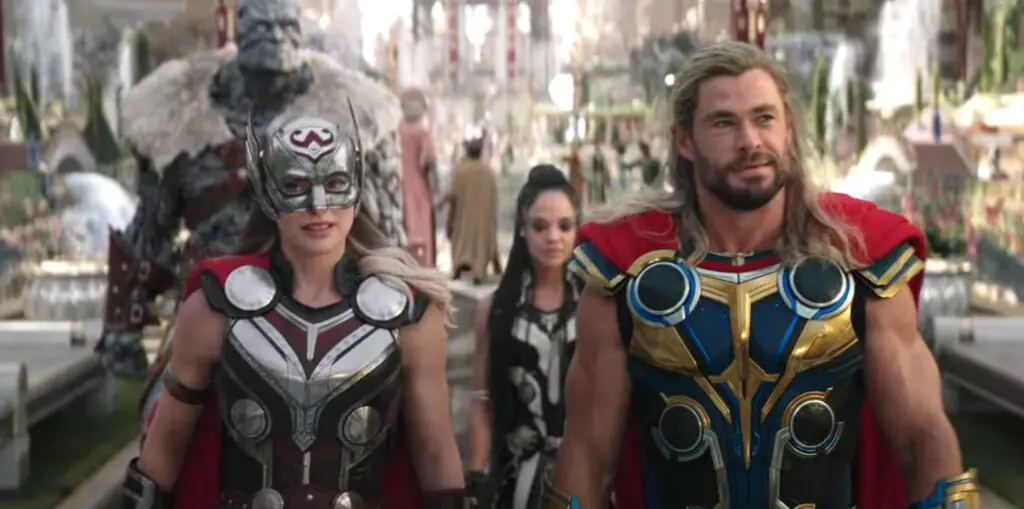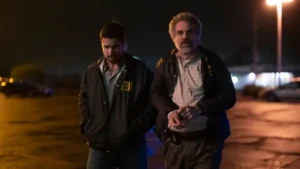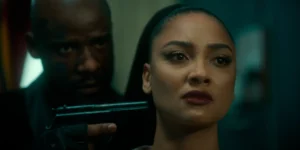Summary
A jaded look at perhaps the most tonally off-brand and ego-centric Marvel film that convinces me that the MCU is a rudderless ship that has lost its magic and direction.
Thor: Love and Thunder sees Chris Hemsworth return as Thor, God of Thunder, returning to action with The Guardians of the Galaxy, and embarking on a quest to stop Christian Bale’s Gorr The God Butcher from killing Gods throughout the universe and reaching Eternity.
On the way, we catch up with Valkyrie, bored in her role as King of New Asgard, a feeling ably represented in the performance from Tessa Thompson, and Jane Foster, love interest of Thor, receiving chemotherapy for Stage 4 cancer, and realizing that Thor’s broken hammer Mjolnir may be her salvation.
The initial and most glaring problem with the film is presented to us immediately in the opening scene, with Bale and his daughter Love being the last dying remnants of a civilisation, after being neglected by their God of choice. When his daughter dies, he has an encounter with his God Rapu, who is a pompous and boorish fool that has no interest in his last remaining worshipper. Gorr finds the Necrosword, a weapon capable of killing Gods, and murders Rapu before setting out on a mission of his own to destroy Gods in the universe.
The glaring mismatched tone of these opening events is the film’s biggest problem, with the cringe-inducing sledgehammer humor of director Taika Waititi being injected into every scene, regardless of stakes, character, or consequence. The death of Gorr’s daughter, providing a good super villain origin story, is immediately countered by the inane ramblings of the Rapu character, and this style of storytelling, witnessed throughout recent Marvel entries, is turned up to eleven for the rest of this outing.
The opening set piece with Thor in action with the Guardians of the Galaxy sees the team trying to save a civilization, and results in Thor destroying the citadel they were trying to protect. Thor is stupid, you see, and incompetent, a thread that runs throughout the film. This encounter sees Thor gifted two giant goats that scream, and instead of a one-off joke with the goats being noisy, they become almost integral to the plot and are used as a comedy go-to whenever the script runs out of one-liners. Like the rest of the screenplay, this joke becomes old very quickly.
Meanwhile, Jane Foster (Natalie Portman) is finally united with Mjolnir and becomes Thor. Why Mjolnir becomes whole again is not addressed, and despite the premise depicted to us earlier in the screenplay that states that Mjolnir makes you healthy, it is revealed that the opposite is happening, for no good reason, and the magic hammer is instead making Jane less responsive to the chemotherapy that she was receiving to fight her cancer. This stupid and insulting type of writing seems to only be here to make us empathize somehow with Jane, and provide Waititi with some artificially earned “feels”. Using the cancer storyline of a character in a film that seems to be relishing in deconstructing the superhero genre is simply awkward to watch, and smacks of a director who has none of the required filmmaking skills to make such a plot aspect work.
As things progress, Bale is doing his best to bring us a villain that is terrifying and disturbing, but the comedy that penetrates every scene simply cancels out any stakes that Bale’s performance is trying desperately to bring to the proceedings. When Gorr kidnaps the children of New Asgard in an attempt to lure Thor, and ultimately Stormbreaker, to his lair, he acts like a pantomime baddie, and not the horrific creature he has become. We never feel for one moment that these children are in any danger at all. When Thor somehow develops psychic powers to contact the kidnapped group, Waititi cannot present us with a tense scene of Thor trying to comfort the terrified children and reassure them of their safety; instead, we have another shot at cheap humor, having Valkyrie tickling his nose like a child unaware of the situation, as he talks to these kidnapped children. These kids have been abducted by a murderous God-killing psychopath, and Valkyrie tickles Thor’s nose as he tries to interact with them. Give me strength.
The cast then travels to Omnipotent City, where we meet the ridiculous Zeus, portrayed by Russell Crowe. Cue more silly humour, including Thor becoming naked in what seems to be a homage to The Benny Hill Show, and seemingly killing Zeus. Crowe’s accent here is stupid, unfunny, and cringeworthy. In fact, the whole scene is, and at this point, there is really no way the film can get out of its own path. The audience I watched this with was becoming quieter and quieter, as jokes failed to land, and Thor was reduced to being a foil for everyone’s jokes.
By the time our band of heroes gets to Gorr’s lair, I had lost all faith in anything of consequence happening. We are baited and switched so many times that it is impossible to care about anything that happens. Valkyrie is stabbed, but she’s fine. Korg is crumbled to rubble, but it’s okay as he can build another body. Jane Foster dies, but it’s fine; she’s in Valhalla. Bad king of the Gods Zeus is impaled by his own weapon, but he’s fine and is set up as a villain for the next movie. Gorr’s daughter dies in the first scene, but he makes a wish with Eternity and brings her back at the end to be brought up by Thor. Everything has no stakes, and as a result, nothing matters.
Thor magically imparts his powers to the children that Gorr has stolen, somehow giving them powers like his own, to fight the shadow monsters. Had Thor perhaps used this ability in Endgame, they could have prevented Thanos from wiping out half the universe in the first place. Imagine that Wakandan army, imbued with Thor’s powers , fighting Thanos. But he didn’t, because he can’t do that until the plot requires it. Lazy hack writing that contradicts things previously established, leaving the audience bemused.
This 2-hour sitcom of a superhero movie makes a mockery of the genre in ways that we have never seen before. Low stakes, low consequence, cute, banal storytelling with characters that barely resemble themselves and tonal shifts that are awkward and insensitive make this a real low point in this franchise, and another sign that the MCU has become a joke to itself and lacks structure and direction. This kind of filmmaking is neither new, innovative, or engaging, and could signal that the Marvel train is derailed and hurtling out of control.




